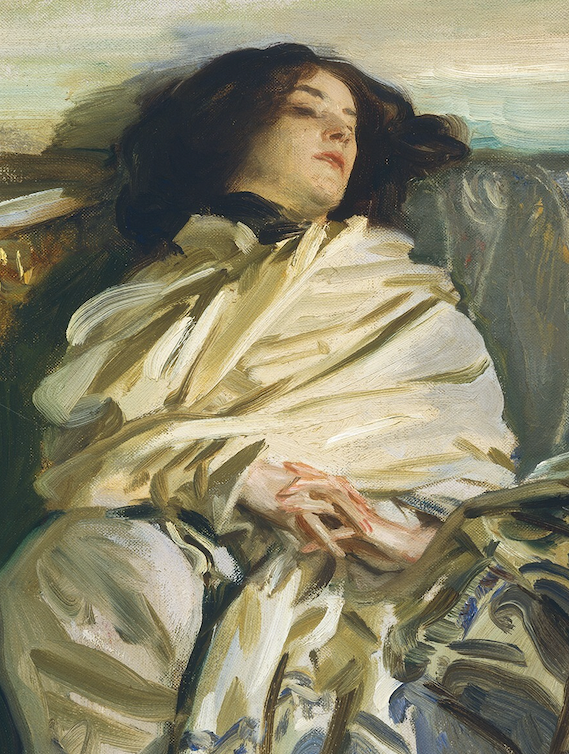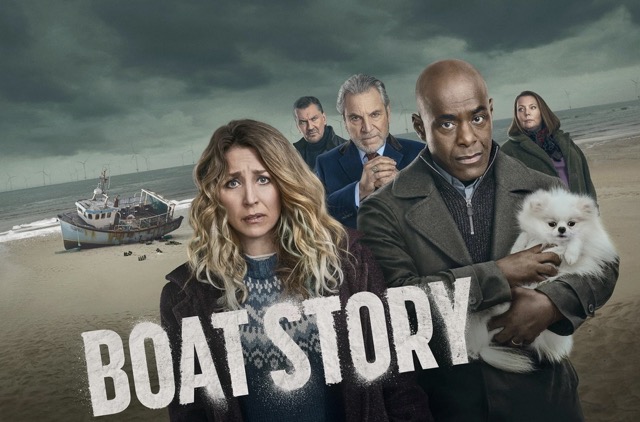As of two days ago, the series Boat Story (2023) wasn’t even on my radar. I thought I’d just check out a bit of the first episode and, just like that, I was carried away on a strong tide of outsized and sometimes gruesome violence, dark and idiosyncratic comedy, compelling characters, pitch-perfect narration, and a complex, twisty, amusing and sometimes perverse plot that kept me utterly immersed until the last word.
Content Note: Did I mention the violence? Because especially in the first couple of episodes you should be prepared for just a staggering amount of blood and people dying. At one point I wondered if anyone was actually going to be left alive. (And, I mean, don’t get too attached, you know?) And while some of it is just the bang bang violence that is there and gone in a flash, there are some actual gory, squelchy bits. (I will not show you those.)
Boat Story doesn’t start with a boat. Well it does, but first it starts with people, because as much as the narrator (Ólafur Darri Ólafsson) will insist over and over again (with the aid of silent movie titles) that this is a Boat Story, this is really a Human Nature Story and People Story, but that doesn’t have the same ring to it. One of the many things I liked so much was how—from the leadingest lead to the guy who only got in a word or two before being blasted away—every single person had something real and emotional to offer. (Okay, fine. There are about eleventy sixty guys who get blasted away. Whatever. You get my point.) The storylines here may be surreal and silly and often wholly unfathomable, but the people feel tangible and real, and also often very funny, which makes the whole thing really sing.
Sometime back before the day a boat washed up on the beach in Applebury, there was the day when Janet Campbell (Daisy Haggard) drove her scooter to work “under smokestacks on a lonely country road” and an industrial accident took most of her right hand. Janet is the heart of this story—dry, unassuming, steely, and stuck in a cycle of shitty events—and Daisy Haggard is an absolute delight to watch at every moment. I found it impossible not to love Janet from the moment she unsuccessfully tries to quell her annoyance with a colleague literally whistling while he works.

So, sometime later, a fishing boat with one man aboard gets caught in a storm at sea. While wind lashes, water swells, and a jaunty French song plays, a lone policeman boards the boat and asks to check things out. (Have I mentioned before how much of a sucker I am for carefree music mixed with dark violence?) He pulls back tarps and at first only sees rows and rows of mackerel on ice, but then he digs deeper and finds rows and rows of carefully packaged kilos of cocaine. A fight breaks out between the two men. The wind continues to howl. The ocean roars. A knife is brandished and slashed and lost in the fray. It’s found again. The sea hammers the boat and the men pummel each other and one thing leads to another and they both end up dead. And the music plays on.

The next morning, the boat is washed up on the beach where Janet is out early walking her neighbor’s dog, something she does often. There, she happens upon Samuel Wells (Paterson Joseph) who is walking his Pomeranian. The two make awkward small talk about how he’s recently “moved up from London” until the story cuts away to a title card that reads “Ground Control to Major Tom.” There’s a sad and stressed-looking Samuel in an empty house calling out for Tom until his daughter signs, “You should use his full name,” at which point he pointedly begins calling for Major Tom. Eventually, we see him explaining to the new owners of the house that they can’t find their cat, giving them his phone number, and leaving them the cat treats. Major Tom is watching this all go down from an upstairs window. And, are both parents smiling as they drive away?
The story will do this a lot: Cut away in the middle of one thing to give backstory on another. Or, sometimes, cut away to a musical adaptation of the story (that takes some fictional liberties). I promise it’s not as dreadful as it sounds. Oh, no. Did you think I meant the actual play? Because that absolutely is a cringe-worthy affair with lines like “insomnia, like an orphan in Bosnia,” which is why it’s so funny and wonderful.

But I’m getting entirely ahead of myself, which is also what this series does. It gets ahead of itself and behind and beside and then catches everything up in the end. Anyway, back on the beach Samuel and Janet notice the boat washed up on the shore, but it’s not until his pure white dog comes back covered in blood that they really take notice of it. When Janet sees the bodies of those two men she wants to call the police right away, but Samuel spies the kilos of cocaine and, his eyes wild with want and maybe desperation, has another idea. Why not take it, sell it, and split the money? Why not indeed!
Samuel, it turns out, was a lawyer back in London who gambled away all his life savings. His wife and daughter still don’t know—no one knows, he says—the truth about why they had to sell their house and move, and this big score could fix it all. Of course, this is just another gamble, another bet that feeds his addiction. On the other hand, Janet’s reasons for wanting it appear at first like revenge—for the the husband who took her beloved stepson and left her for a younger, Jesus-loving woman, for the way her ability to get money from her accident, which was caused by someone else’s negligence was stymied—but ultimately they’re nuanced and complex and perhaps even community building. These two seem like an unlikely pair at first glance—Samuel, with his staid clothing, dark overcoat and tendency to natter on when he’s nervous. Janet with blue highlights in her hair, a local accent, and a more incredulous approach to, well, everything—but, in addition to their mutual desperation, they share a quick-witted intelligence and an opposites-attract kind of dance. They have a radiant chemistry that makes even the most mundane scenes glow, though let’s be entirely clear, there is no romance between them, and it’s the most refreshing thing. Long live platonic partnerships in crime! In fact, women are treated as actual people throughout this series, and you don’t realize how tense you hold your shoulders just waiting for a woman to be sexualized or attacked while watching something (especially something with lots of crime and violence) until it doesn’t happen. (There is one very weird exception to what I’m saying, but it’s not the same and I can’t explain it without basically untwisting everything.) And while everyone in this series is fantastic, I do have to say that this is really and especially Daisy Haggard’s gig, but also very much a story about women coming out victorious. (Men, on the other hand, seem to fall somewhere between distressing and ghastly.) And that’s really all I can say about that. Also something that I can’t say too much about is that I think the pair turn a lot of expectations on their heads. Not right away, perhaps, but ultimately.
While Samuel and Janet are loading up his car with cocaine, former EMT worker and current pasty baker and mother Pat Tooh (Joanna Scanlan) is picking up litter on the beach, and she’s the one who eventually calls in the boat to the police. What she sees and doesn’t see that morning will eventually be key to a lot of things. But first, what’s important is that the drugs, of course, belonged to someone before Samuel and Janet picked them up, shoved them in the trunk, and brought them to a storage facility staffed by Harold of Harold’s Life Hacks (Danny Kirrane).

Away in France, The Tailor (Tchéky Karyo), as he is known, who is meticulously dressed, groomed, and spoken, is measuring a man for a suit. He’s a consummate professional and incredibly skilled. He compliments the man on his shoulders and tells him he has no flaws. The man laughs, knowing it’s a lie but basking in the compliment anyway. When the man leaves, The Tailor goes into the back room where another man is bound to a chair and gagged. “I apologize,” says The Tailor to the hostage he is about to torture, “I had a man with a torso the size of a rabbit.” And this man, friends, this Tailor with no name, is the one missing a boatload of cocaine. If you aren’t terrified and intrigued by him, you should probably stop watching now.

In short order, his masked henchmen—after definitively not playing rock-paper-scissors to decide who will be the getaway driver and then discussing the merits of a twenty-percent off coupon for an all-you-can-eat Chinese buffet on the back of their poorly drawn map—shoot up the police station in search of the drugs, one of them pausing to lovingly touch a piece of pottery. Janet and Samuel reach out to an old client (Phil Daniels) of his who is in prison for advice on how to move the cocaine, which sets the wheels in motion to put them in contact with Vinnie (Adam Gillen), a local gang leader with some seeming emotional attachment issues.


The Tailor arrives in Applebury, where he has a fantastic exchange with a woman where he says pastries with increasing vacillation and she says pasties with increasing determination, which actually says a lot about what’s to come. He scolds Guy (Craig Fairbrass), his head henchman, for making such a mess at the police station and for bringing him problems and not solutions, which will have a momentous effect on events to come. Let me pause here to say how divine Guy is. He has just enough regret, emotional intelligence, humor, and yearning that you can’t help but root a bit for the man that is a paid and unrepentant killing machine. Or at least I couldn’t. And there’s a police officer, Ben (Ethan Lawrence), who, like Guy, is trying to prove himself to his boss by bringing him only a positive end result, because he’s tired of being the butt of everyone’s jokes and unseen, though mostly he broke my heart, which is a little like Guy as well.


I don’t want to say too much more. I may have said too much already. I’m glad I went into this knowing so little. Though had I realized earlier that the series is by Harry Williams and Jack Williams, the same sibling team behind things like The Tourist (2022-) and Baptiste (2019-2021), I wouldn’t have been surprised to have found so many elements or actors I enjoyed. The ending is more upsetting and then gratifying than I can explain without you having all the backstory, which I can’t possibly provide both because it would take too long and because it would ruin everything, but I can say that knowing what I know now, I would watch it all again. Though, my gods, I do wish that someone had done post-production editing or whatever to make the blue in Janet’s hair consistent. Or is it intentional? Somehow symbolic? It was wildly distracting to me.
Overall Rating on the Chronically Streaming Pain Scale:











